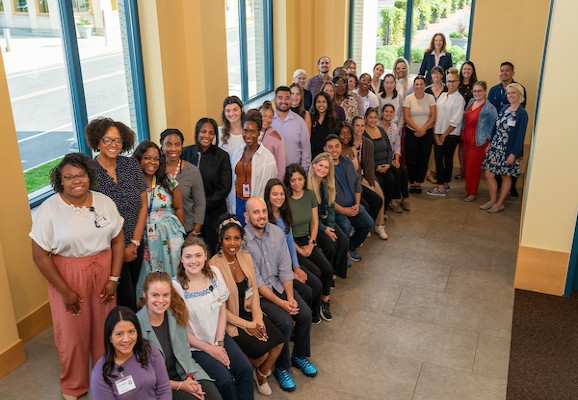
September 20, 2024
A conversation with Kerry Bamrick, Executive Director, Consortium for Advanced Practice Providers
Across the country, newly minted advanced practice providers have arrived at their postgraduate training programs. These programs are the heartbeat of clinical professional formation. They are the places where new providers work full-time under expert clinicians and experience the real-world clinical challenges that begin to shape them as professionals. We spoke with Kerry Bamrick, executive director of The Consortium for Advanced Practice Providers, a cornerstone of the Moses/Weitzman Health System, to learn more about postgraduate training for advanced practice providers. As Bamrick explains, thanks to the work of Dr. Margaret Flinter and others at Community Health Center, Inc., nurse practitioners and physician assistants/associates have access to rigorous postgraduate training. As Bamrick often says, “What started off as a model has become a movement.”
What is an “advanced practice provider”?
KB: Advanced practice provider is a term used to describe nurse practitioners and physician assistants/associates. APPs are highly trained, licensed, and possess advanced clinical skills and knowledge, allowing them to diagnose, treat, and manage a wide range of medical conditions. APPs care for people of all ages in all areas of medicine. They have demonstrated their ability to work autonomously at a high level across the four pillars of advanced practice: clinical practice, leadership and management, education, and research.
Why are APPs important in healthcare?
KB: The United States has an urgent need to increase the number and improve the distribution of expert primary and specialty care providers. In the federally qualified health centers that care for 10% of the country’s population—31 million patients—nurse practitioners and physician associates make up 50% of the primary care provider workforce. Hospitals, ERs, and specialty practices also rely on advanced practice providers. APPs play a pivotal role in enabling organizations not only to survive, but to thrive.
How does The Consortium participate in APP postgraduate training?
KB: The Consortium was “home grown” at Community Health Center, Inc., a federally qualified health center in Connecticut that launched the nation’s first formal postgraduate nurse practitioner residency program in 2007. Dr. Margaret Flinter, my colleague, led that effort. From the beginning, her vision was to create a nationally replicable, sustainable model for postgraduate training. Since then, Community Health Center has provided support to hundreds of organizations to help them establish and run postgraduate training programs. In 2010, Community Health Center convened an informal group of early innovators and developers to discuss their programs and share best practices and resources. The word “Consortium” means a partnership or union of organizations that come together for a shared purpose. That’s exactly what we do.
How did accreditation become part of your work?
KB: Among these early programs, one topic came up continuously: the need for accreditation. This was a brand new concept, and there were no accrediting bodies for postgraduate nurse practitioner training programs. Back in 2010, I was tasked with trying to identify an accrediting agency that would accredit these types of programs. I reached out all the national accrediting bodies, but no one was interested. Back then, I don’t think these accrediting organizations saw the business opportunity nor the growth potential of these programs. So the Consortium developed the standards, infrastructure, and organizational base to become an accrediting body. We have earned federal recognition by the United States Department of Education as an accrediting agency for postgraduate nurse practitioner and joint nurse practitioner and physician associate/physician assistant training programs.
We aim to increase opportunities for fully credentialed and licensed novice nurse practitioners and physician assistants/associates to participate in high quality, structured, postgraduate training programs that adhere to rigorous standards.
Why do you think APPs benefit from participating in a postgraduate training program?
KB: Postgraduate training programs provide new APPs with an intensive experience focused on training to clinical complexity and high performance. These programs provide a highly structured transition from university to practice that supports the development of confidence, competence, and mastery of practice. Postgraduate training strengthens the workforce, and that in turn improves the quality of patient care.
Why do you recommend that training programs become accredited?
KB: Accreditation provides public recognition of excellence and national acknowledgement of quality. The primary purpose of accreditation for APP postgraduate training is quality assurance. Accreditation provides the public with a recognizable seal of approval that is an indication of quality and integrity. Potential trainees, potential employers and others use programmatic accreditation as a mechanism to identify training programs that meet national standards of educational quality. Individuals who graduate from these programs have been well prepared in discipline-specific knowledge, skills, and attitudes.
Accreditation means that an institution that is hosting an APP postgraduate training program can assure applicants who are applying to the program, as well as patients receiving care from the APP resident/fellow, that the program sufficiently meets peer-reviewed quality standards. Through accreditation and reaccreditation, organizations can further develop their programs by systematic self-evaluation against the standards. This lets a program readily identify strengths and weaknesses, refine its curriculum, and otherwise enhance the program to reflect the realities of challenging and changing practice environments. This last point is critical to understanding the benefits of accreditation. Change in healthcare and the health professions is a constant. When APP postgraduate programs are accredited, they join a group of APP postgraduate training programs that emphasizes collegial and collaborative inter-professional practice, and networking.
What new initiatives or ideas are on The Consortium’s horizon?
KB: The Consortium plans to enhance its educational offerings to members and non-members to include trainings around wellness promotion; justice, equity, diversity, and inclusion; and technology. We would like to conduct formal research on the outcomes of APP postgraduate training. This initiative will elevate the role of APPs and society’s understanding of the role, while promoting the value APPs play in the healthcare system. In the future, we hope to modernize and revolutionize accreditation operations using new technology and automation to streamline all steps involved in the process.
You often say, “What started as a model has become a movement.” What do you mean by that?
KB: Across the country, the idea of postgraduate training for advanced practice providers has taken root. There has been incredible fidelity to the model that the Community Health Center first created in 2007. Today, there are 548 APP postgraduate training programs in the United States. To go from one program in 2007 to over 500 programs in 2024—that is a movement! Ultimately, we are helping to create a healthcare workforce that meets the needs of our patients and our society.
To learn more about The Consortium’s accreditation and membership opportunities, please visit its website. The Consortium is an affiliate of the Moses/Weitzman Health System, the nation’s first health system dedicated to primary care.
